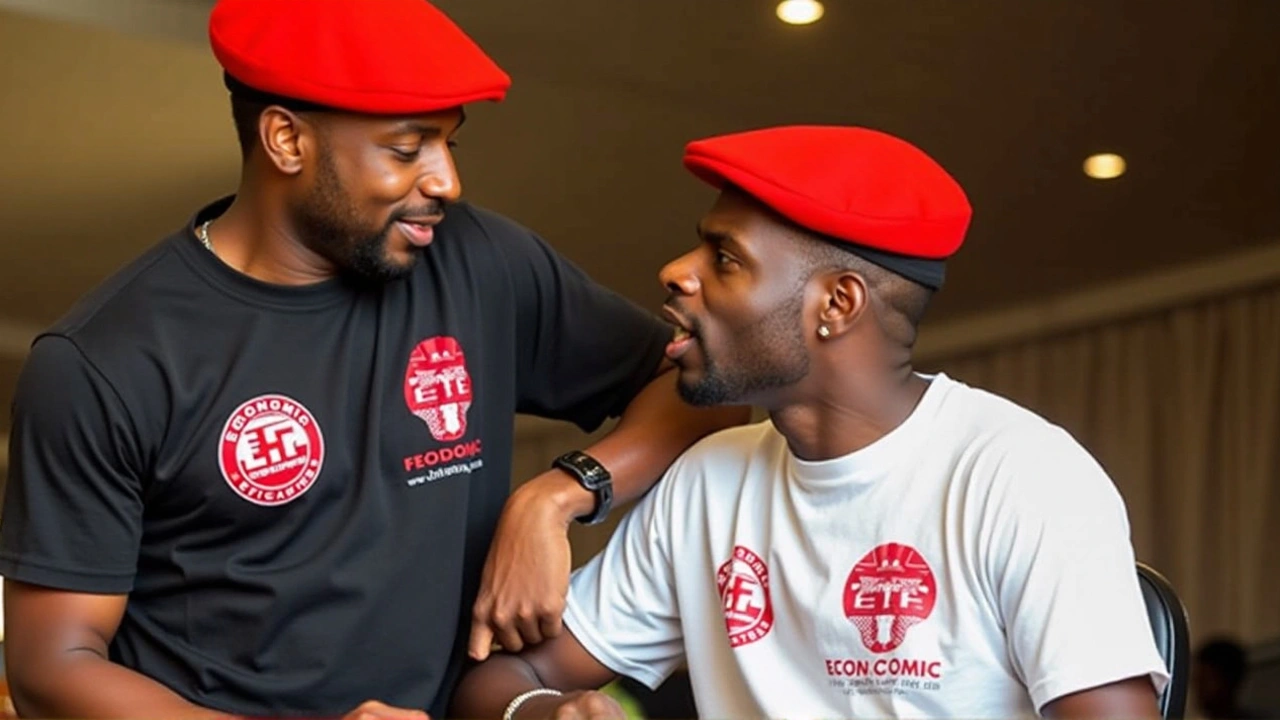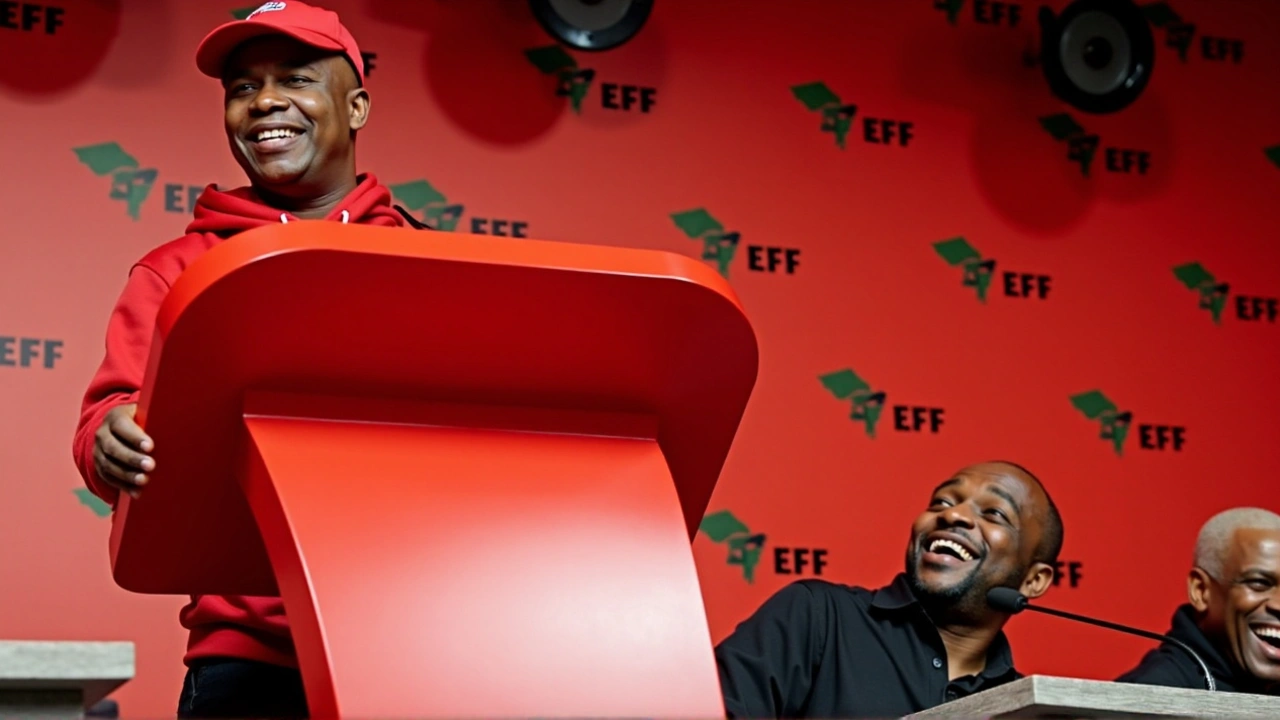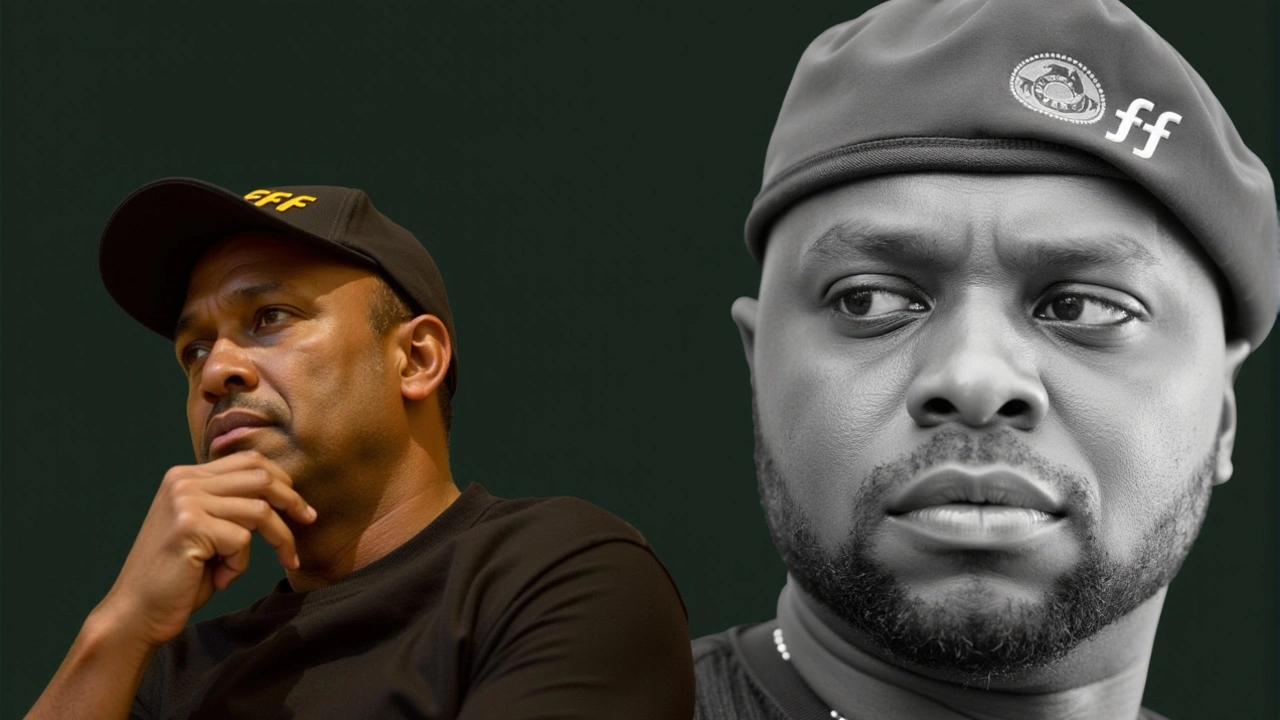Floyd Shivambu's Departure from EFF Signals a Major Shift in South African Politics

Floyd Shivambu Steps Down from EFF Leadership
In a move that has sent shockwaves through the political landscape of South Africa, Floyd Shivambu, the Deputy President and a founding member of the Economic Freedom Fighters (EFF), has announced his resignation from the party. Shivambu’s departure comes at a critical time, just months ahead of the EFF’s third elective conference. The announcement was made during a media briefing where Shivambu revealed his decision to join Former President Jacob Zuma’s MK Party.
For many, this resignation is nothing short of a tectonic shift within the party dynamics of the EFF. Having co-founded the party alongside Julius Malema 11 years ago, Shivambu has been a central figure in its rise to prominence in South African politics. His departure is indicative of deeper issues within the EFF, primarily a rift with Malema. According to political analysts, including Dr. Ntsikelelo Breakfast, this can be seen as a considerable loss for the EFF and raises several questions about the party’s future.
The Origins of the Rift
The precise nature of the rift between Floyd Shivambu and Julius Malema has been the subject of much speculation and debate. Internal sources suggest that their differences are both ideological and personal. The tension between the two leaders has reportedly been growing over the past few years, culminating in this decision by Shivambu to step down.
The EFF was born out of a shared vision for economic freedom and equality in South Africa. However, as the party grew, so did the complexities of leadership and the differences in vision. Shivambu’s departure to join Jacob Zuma’s MK Party highlights these growing pains. While the exact reasons for the split are still under wraps, it is clear that the ideological differences played a significant role.
Implications for the EFF
Political analysts are already weighing in on what this means for the EFF. Dr. Ntsikelelo Breakfast and other experts view Shivambu’s resignation as a critical juncture for the party. The EFF, known for its radical stance on economic reforms and land redistribution, now faces a potential shift in its internal power dynamics.
With the upcoming elective conference, the party will need to address these internal conflicts and present a unified front. Shivambu's exit could also influence the perspectives of party members and the public. Many will be watching closely to see who will rise in leadership and how they will steer the party forward. The EFF’s ability to navigate this period of turbulence may determine its future role in South African politics.
Reactions from the Political Sphere
Reactions to Shivambu’s resignation have been swift and varied. Politicians, analysts, and public figures have all weighed in on the potential ramifications. Supporters of the EFF express concern over the loss of a key leader, while critics see this as an opportunity for other parties to gain ground.
One clear outcome is that the MK Party, with Shivambu’s entrance, might gain new momentum. This development has the potential to reshape alliances and strategies across the political spectrum. It remains to be seen whether Shivambu’s move will bring more cohesion or further fragmentation to South African politics.

Floyd Shivambu's Legacy and Future Prospects
As a leader, Shivambu has left an indelible mark on the EFF and South African politics. His outspoken nature and dedication to the party’s cause have earned him both praise and criticism. Now, as he embarks on a new journey with the MK Party, his future moves will be under intense scrutiny.
Former President Jacob Zuma, who has had his political trials and tribulations, welcomes Shivambu's experience and leadership. This partnership is likely to infuse new energy into the MK Party, positioning it as a formidable player in the political landscape.
The Road Ahead for EFF
The resignation of a founding member like Floyd Shivambu cannot be taken lightly. The EFF will need to address the underlying issues that led to this situation. Leadership transitions are always challenging, but they also present opportunities for renewal and growth.
As the EFF prepares for its third elective conference, it will be crucial for the remaining leadership, particularly Julius Malema, to foster unity and re-align the party’s goals. The conference will be an important platform for addressing the party’s direction and resolving any lingering conflicts.
In this period of change, the EFF must navigate carefully. The dynamics within the party, as well as its relationship with the broader political community, will play a significant role in shaping its future. Shivambu's resignation is a stark reminder of the volatility in political alliances and leadership.

Conclusion: A New Chapter in South African Politics
The resignation of Floyd Shivambu from the EFF signals the end of an era and the beginning of a new chapter. It highlights the fluid nature of political affiliations and the ever-changing landscape of South African politics. The coming months will be critical not just for the EFF but for the entire political spectrum.
Observers, analysts, and the public will be keeping a close watch on the developments that follow. The ripple effects of Shivambu’s move are likely to influence the upcoming elections and the general political climate. Whether this leads to positive change or further fragmentation remains to be seen.
Floyd Shivambu’s legacy with the EFF will undoubtedly be remembered, and his next steps with the MK Party will shape the future of his political journey. For now, the spotlight is firmly on the EFF, its leadership, and the strategies they employ to move forward.
12 Comments
william wijaya
Whoa, the political tectonics have just shifted under our feet. Floyd Shivambu's exit feels like a seismic tremor in the EFF’s power matrix, reverberating through the corridors of South African politics. The jargon-packed narratives of “strategic realignment” and “ideological bifurcation” now dominate the discourse. It’s almost cinematic, the way the deputy president steps away just as the party gears up for its third elective conference. The whole saga is a cocktail of ambition, legacy, and a dash of raw political chemistry.
Lemuel Belleza
Seems like another typical power shuffle.
faye ambit
When we examine the departure of a founding figure such as Shivambu, it offers a reflective mirror on the mutable nature of political collectives. The EFF, built on principles of economic emancipation, now faces an essential pivot point that could redefine its ideological core. One must consider how personal dynamics intertwine with broader systemic pressures, especially in a landscape as volatile as South Africa’s. The rift between Shivambu and Malema appears not merely personal, but emblematic of deeper doctrinal disagreements. Moreover, the timing-just months before a crucial elective conference-adds a layer of strategic urgency. Historically, such schisms can either fortify a movement through renewed focus or fracture it into competing factions. It is essential for the remaining leadership to foster an environment of inclusive dialogue, ensuring that dissent does not devolve into division. The role of mentorship, even in contentious moments, can guide newer members toward a cohesive vision. In practice, this means creating platforms where diverse viewpoints are not only heard but integrated into policy formulations. While the MK Party stands to gain from Shivambu’s experience, the EFF must recalibrate its trajectory to maintain relevance. The broader political ecosystem will undoubtedly watch how these internal adjustments unfold, as they could signal shifts in coalition dynamics. Ultimately, the resilience of any party lies in its capacity to adapt without losing its foundational ethos. As observers, we should remain vigilant, supporting constructive evolution rather than succumbing to cynicism. This period, though fraught with uncertainty, also carries the promise of renewal for the EFF and South African politics at large.
Subhash Choudhary
Man, this feels like a classic case of internal drama spilling out onto the national stage. I’m just watching from the sidelines, trying to piece together what this means for the upcoming conference. The vibe is definitely tense, but maybe it’ll push the party to tighten its message.
Ethan Smith
The implications for the EFF’s internal cohesion are quite significant. A precise analysis suggests that the leadership will need to address the ideological gaps that this departure highlights. Maintaining a unified front will be essential for the party’s credibility moving forward.
Evelyn Monroig
Do you even realize how this is just the tip of the iceberg? The whole system is rigged, and Shivambu’s move is evidence of the hidden cabal pulling the strings behind Zuma’s MK Party. They’re orchestrating a power grab with the public none the wiser!
Gerald Hornsby
Drama alert! The stage is set, the lights are blazing, and the plot thickens with every headline. 🎭
Hina Tiwari
Wow, i can see the *excitement* 🤔 But also, it sad when frens part ways. It cud be for the beeter, i hope they find peace n each otter's path.
WILL WILLIAMS
Let’s channel this energy into something positive! This shift could spark fresh ideas and bold moves across the political spectrum.
Barry Hall
Totally agree! 👍
abi rama
Even in turbulence, there's room for optimism. The EFF can emerge stronger if they navigate this wisely.
Megan Riley
Hey team!!! Remember, every challenge is a chance to grow!!! Stay focused, stay positive, and keep pushing forward!!! Let’s support each other!!!

Write a comment